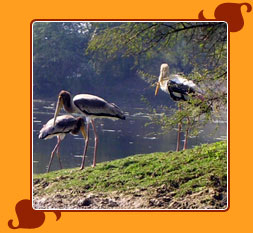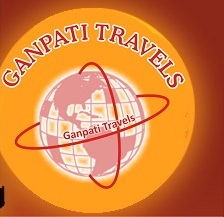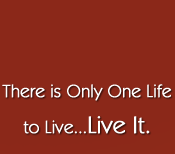Bharatpur is today known as the country's finest
bird sanctuary, but before independence its fame was more generic. Bharatpur
was the premier Jat state in Rajasthan, Dholpur being the other one. In a
sense Bharatpur is the legacy of Churaman, a Jat overlord whose forces were
a source of constant irritation to the Mughals in the late 17th century. The
Mughals retaliated by destroying Jat villages. The Jats later regrouped
under Badan singh who firmly entrenched himself in a belt along the river
Jamuna between Delhi and Agra.
 History
of Bharatpur, Rajasthan Bharatpur -
History
of Bharatpur, Rajasthan Bharatpur - The 'Eastern Gateway to
Rajasthan', was founded by Maharaja Suraj Mal in 1733 AD, it was once an
impregnable well fortified city, carved out of the region formerly known as
Mewat. The trio of Bharatpur, Deeg and Dholpur has played an important part
in the history of Rajasthan. The place was named as Bharatpur after the name
of Bharat, the brother of Lord Rama, whose other brother Laxman was
worshipped as the family deity of the Bharatpur.
The legends say
the rulers Laxman's name is engraved on the state arms and the seals. The
city and the fort have been believed to be founded by Rustam, a Jat of
Sogariya clan. Maharaja Suraj Mal took over from Khemkaran, the son of
Rustam, and established the empire. He fortified the city by building a
massive wall around the city. The interesting aspect of the Bharatpur
history is the domination of Jats in the region since 17th century. Leaders
like Churaman and Badan Singh brought the jats together to mould them into a
force to reckon with. Suraj Mal has been the greatest ruler who made them a
formidable force and played a very important role in the Indian history
during 19th century.
Places to see North of
Bharatpur is this beautiful garden town, the gardens have been laid with
great care and precision, the sparkling fountains and meticulous palaces add
to he beauty of this idyllic retreat of the princes of Bharatpur. The
tourist enjoy the charming settings of this agricultural town,along with the
well preserved palace pavilions and gardens. Some very interesting buildings
can be observed like:
GOPAL BHAVAN: Completed
in 1760, an imaginatively designed building complex with beautifully laid
gardens at its entrance and the rear overlooks the Gopal Sagar which is
flanked with smaller pavilions Sawan and Bhadon. The formal gardens face a
raised terrace with an arch of lustrous marble installed on a pedestal in
the form of swing.
This exquisite swing is a war trophy brought in
by the famous Jat king Raja Suraj Mal from the Mughal court in Delhi. The
spacious and well proportioned Banquet Hall has a double row of graceful
pillars. The rear of the chamber is further divided by a charming sunken
pool with fountains. The Banquet hall houses a rich collection of curios,
souvenirs and Victorian furniture. Staircases wind upstairs to the upper
floors. One room contains a solid black marble bed from Delhi.
BENGAL
CHAMBER: It houses the dining room, and has sloping arches, with
comfortable cushions along the outer edges forming the seating area. The
walls of the royal Chess Room has trellis design and are painted in soft
red.
SURAJ BHAVAN: To the east of the main
building, this palace has balconies overhanging the water. The entire palace
in marble is like an airy pavilion with fine ornamentation within the
apartments.
NAND BHAVAN: It is a larage
audience hall. KRISHNA BHAVAN, and the ingeniously designed water works of
KESHAV BHAVAN, with open twelve pillared pavilion are of great interest.
PURANA MAHAL: It is the oldest palace,
planned as a spacious rectangle encircled by compartments and chamber, it
has a collection of some very fine Rajput and Mughal schools.
DEEG
FORT: The fort stands majestically over a slightly elevated point,
built by Raga Suraj Mal. The fort is surrounded by impressive moats, armpits
and gateways, the interiors are mostly in ruins now, but the watch tower
still stands in the ruins keeping an eye over the City and Palace; over it
is placed a gun captured from Agra fort. Another defunct cannon which was
captured from Ahmad Shah Abdali(1761), who seized the fort for six months,
guards a vantage.
LOHAGARH FORT OR THE 'IRON FORT':
The Lohagarh Fort, true to its name stood solidly in front of many
British attacks, and frustrated them to ends. It faced the British onslaught
four times and after a long siege they had to withdraw, but Lord Lake,
however was successful in capturing it in 1804. Some interesting monuments
in the fort are Kishori Mahal, Mahal Khas and Kothi Khas. Moti Mahal and
towers like Jawahar Burj and Fateh Burj were erected to commemorate the
victory over the Mughals and the British army . The Gateway has paintings of
huge elephants.
THE PALACE: It is a fine
blend of Mughal and Rajput architecture, built in various phases by
different Maharajas. The magnificent apartments are richly decorated with
patterned floor tiles with exquisite intricate designs. The museum occupies
the main central wing depicting collections dating back to 2nd century,
which reflect the art and skill of the region.
How
to Reach thereAir: The nearest airport is
situated at Agra, which is 56-kms from Bharatpur.
Rail:
Regular rail services connect Bharatpur with all the major cities of India
such as Delhi, Mumbai, Jaipur and Agra. The Bharatpur railway station is
6-kms from the park
Road: An excellent network
of roadway services connects Bharatpur to all the major cities of the
Rajasthan and its neighbouring states like Delhi, Uttar Pradesh, Haryana.
Bharatpur is well connected by road from Agra (56-kms, 5 hours), Delhi
(176-kms, 5 hours) and Jaipur (176-kms, 6 hours), all of which have airport
facilities too.






 History
of Bharatpur, Rajasthan
History
of Bharatpur, Rajasthan